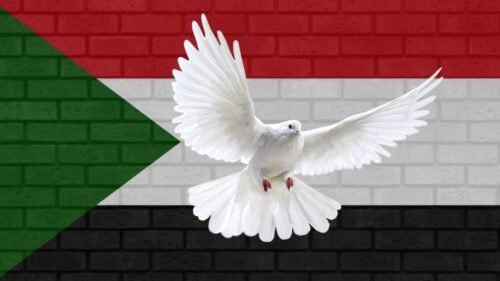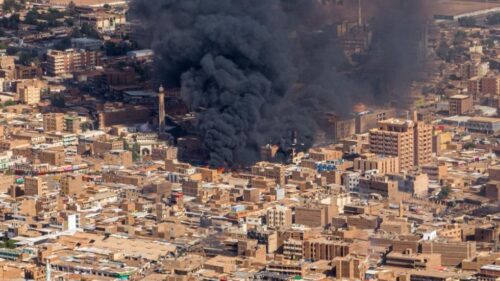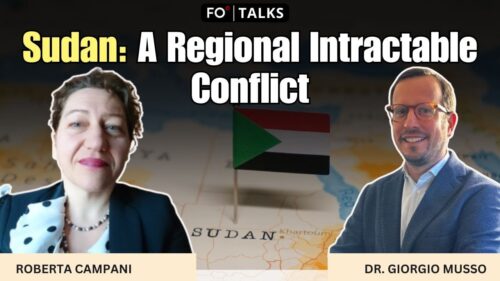The war in Sudan, which pits the Sudanese Armed Forces (SAF), led by General Abel Fattah al-Burhan, against the Rapid Support Forces (RSF), led by General Muhammad Hamdan Dagalo — best known as Hemedti — shows no signs of ending.
This, despite intense international efforts to halt the fighting.
The “Quad,” which has been trying to resolve the Sudan crisis, consists of the United States, Egypt, Saudi Arabia and the United Arab Emirates (UAE). This coalition proposed a roadmap in September 2025 aimed at ending the conflict in Sudan through a three-month humanitarian truce, followed by a permanent ceasefire and then a nine-month transitional process to establish civilian-led governance. The Quad’s plan calls for an immediate ceasefire, a humanitarian truce to allow aid delivery and an inclusive political process.
There is little sign of progress.
Why the war can’t be halted — level one
The war, which erupted on April 15, 2023, has pushed millions to the brink of survival, according to the UN: “Over 30 million people now need urgent humanitarian assistance, among them 9.6 million displaced from their homes and nearly 15 million children caught in a struggle for daily survival.”
It has left most of western Sudan, bordering on Chad, Libya and the Central African Republic in the hands of Hemedti and the RSF. The center and much of the east is held by the SAF and al-Burhan.
In one sense, this reflects long-standing tensions: between the people living along the Nile, who generally look northwards to Egypt, and the people of the periphery, whom the Sudanese elite has traditionally marginalized.
Why the war can’t be halted – level two
If the war is horrific, it has also drawn in too many actors to allow a resolution. The SAF — and al-Burhan — rely on Egypt, Iran, Turkey and Saudi Arabia.
Egypt is a significant ally of the SAF, recognizing the Sudanese army’s leadership as the legitimate government, and is reported to have provided training for SAF pilots and supplied drones, although Egypt officially denies some of these claims.
Iran has supplied drones to the SAF and seeks to use Sudan as a strategic logistical base related to its interests in the Red Sea region. Turkey has also supported the SAF with drones and various warheads, aiming to maintain influence and secure access to the Red Sea. Saudi Arabia leans toward supporting the SAF, given its interest in the region’s stability.
Hemedti and the RSF are backed by the warlord in eastern Libya, General Khalifa Haftar. The area Haftar controls allows the UAE to fly vast quantities of aid — military and humanitarian — to Hemedti. The UAE is his most important backer. “The RSF is but one of the nodes in a network of non-state actors the UAE has curated over the past decade,” wrote Associate Professor and Strategic Risk Consultant Andreas Krige.
Middle East Eye published a detailed article outlining how the UAE flies in supplies via Puntland in Somalia, but other routes, including Uganda, have been used. In return, Hemedti pays the UAE from the gold he extracts from mines he controls along the border.
These gold mines have provided the RSF with a steady source of revenue, allowing it to buy weapons, pay fighters and sustain its military operations, thereby prolonging the war. Once a camel trader, Hemedti has become immensely rich. In the past, the Russians supported the RSF via the Wagner Group, but this appears to have fallen away.
There is also a racial element that underlies the RSF: African ethnic groups in the Darfur area are regarded by the Barggara, of whom Hemedti is one, as “enslaveable”.
The Baggara Arabs traditionally regarded certain African tribes in Darfur and surrounding regions as “enslavable,” particularly those groups who were non-Arab and often of darker skin and different cultural backgrounds. Key tribes that were targeted for enslavement by the Baggara included various Nilotic and other indigenous African groups in the region.
This included groups such as the Fur (though also rulers of Darfur), Zaghawa and especially the Fur’s southern neighbors and more peripheral groups in Dar Fertit, who were often labeled as “Fertit” or people from the forest zone, seen as more vulnerable to enslavement.
The Baggara, as nomadic Arab cattle herders, traditionally practiced slave raids primarily targeting African farming and village communities, whom they viewed as inferior and socially subordinate. These slave raids were a longstanding practice connected to the economic system and social hierarchy of the region, reinforced over centuries by warfare, raiding and trade.
Thus, the “enslavable” groups were primarily African ethnic groups living in Darfur’s southern and peripheral zones, typically those who were non-Arab and who had less political power or military strength, making them vulnerable to capture and enslavement by the Baggara.
In this, the Baggara are little different from the Fulani, who are spread across much of the Sahel, and who founded the Sokoto Caliphate in Niger and Nigeria, which had at least two million slaves when it was finally destroyed by Britain in 1903.
There is strong evidence that the RSF has taken out and butchered men and women purely because of their race.
Why the war can’t be halted — level three
If the West really wanted to end the war, it could. But many nations are too engaged with the UAE to take on the powerful families who control the emirates.
The UAE’s western allies, particularly the United States and the UK, have made several significant commitments and promises to the UAE centered around security, economic partnership and technological cooperation:
— The UAE is a close and capable military partner for the United States in the Arab world. This includes deployments alongside US forces in coalition counterterrorism, stabilization and peacekeeping missions, provision of logistical support for US troops, aircraft and naval vessels, and hosting joint training exercises.
— The UAE hosts the Joint Air Warfare Center and contributes to combating extremist groups like Al Qaeda and Al-Qaeda in the Arabian Peninsula (AQAP), as well as supporting a peaceful transition in Yemen and fighting terrorist finance networks.
— The US-UAE defense cooperation agreement, renewed for 15 years, includes the stationing of thousands of American soldiers and massive arms contracts to enhance the UAE’s military capabilities.
— France also remains a significant military ally with a base in Abu Dhabi and arms supply relationships.
— The UAE-US bilateral trade is robust, exceeding $34.4 billion in 2024, supporting over 161,000 US jobs in sectors like aviation, healthcare and infrastructure.
— The UAE remains committed to the Abraham Accords, promoting peace and cooperation in the Middle East, while condemning terrorism and extremism. It has taken a firm stance supporting peace initiatives in the region, including calls for a ceasefire and humanitarian aid in Gaza.
Britain and the UAE also have long-standing security and defense collaborations. Since the signing of a Defence Cooperation Accord in 1996, their armed forces have worked closely to ensure stability in the Arabian Gulf region. The UK provides military training, defense technology and intelligence-sharing, which bolster the UAE’s security capabilities.
In summary, Western allies have promised strategic military support, deepened economic ties, advanced technological cooperation and sustained diplomatic backing aimed at regional stability and prosperity with the UAE as a central partner.
Putting these ties at risk to pressure the UAE into ending its support for the RSF appears implausible. For all of these reasons, it is difficult to see the war in Sudan ending: too many forces are involved and too many futures are at stake.
[Martin Plaut first published this piece on WordPress.]
[Kaitlyn Diana edited this piece.]
The views expressed in this article are the author’s own and do not necessarily reflect Fair Observer’s editorial policy.
Support Fair Observer
We rely on your support for our independence, diversity and quality.
For more than 10 years, Fair Observer has been free, fair and independent. No billionaire owns us, no advertisers control us. We are a reader-supported nonprofit. Unlike many other publications, we keep our content free for readers regardless of where they live or whether they can afford to pay. We have no paywalls and no ads.
In the post-truth era of fake news, echo chambers and filter bubbles, we publish a plurality of perspectives from around the world. Anyone can publish with us, but everyone goes through a rigorous editorial process. So, you get fact-checked, well-reasoned content instead of noise.
We publish 3,000+ voices from 90+ countries. We also conduct education and training programs
on subjects ranging from digital media and journalism to writing and critical thinking. This
doesn’t come cheap. Servers, editors, trainers and web developers cost
money.
Please consider supporting us on a regular basis as a recurring donor or a
sustaining member.
Will you support FO’s journalism?
We rely on your support for our independence, diversity and quality.









Comment